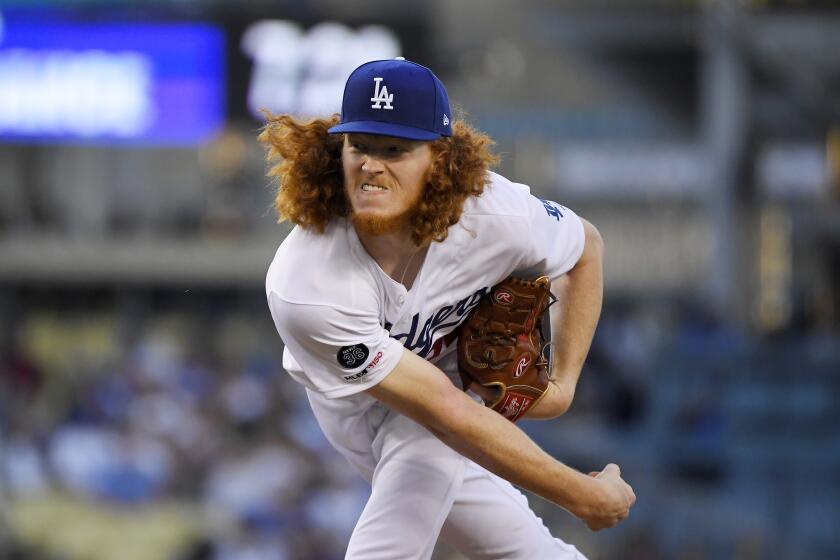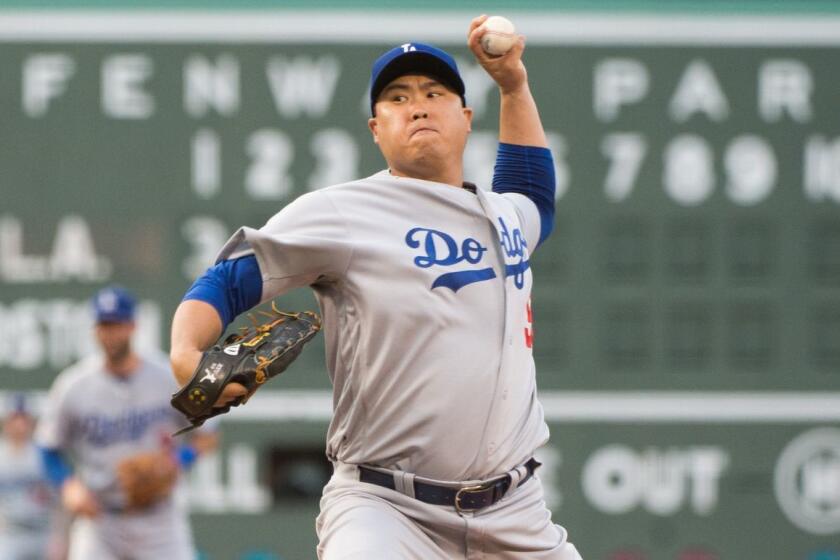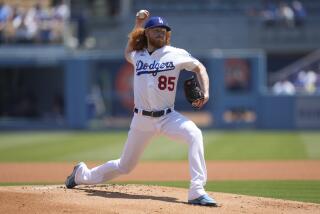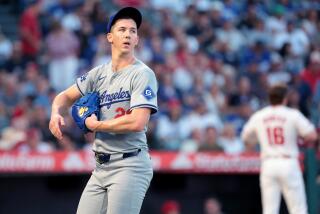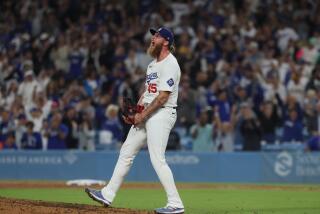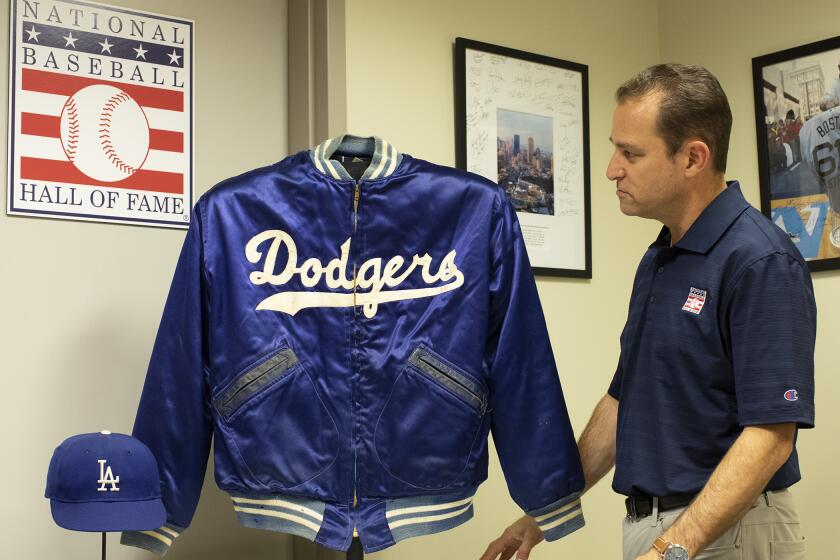Column: Dustin May could help bring much-needed relief to the Dodgers’ bullpen
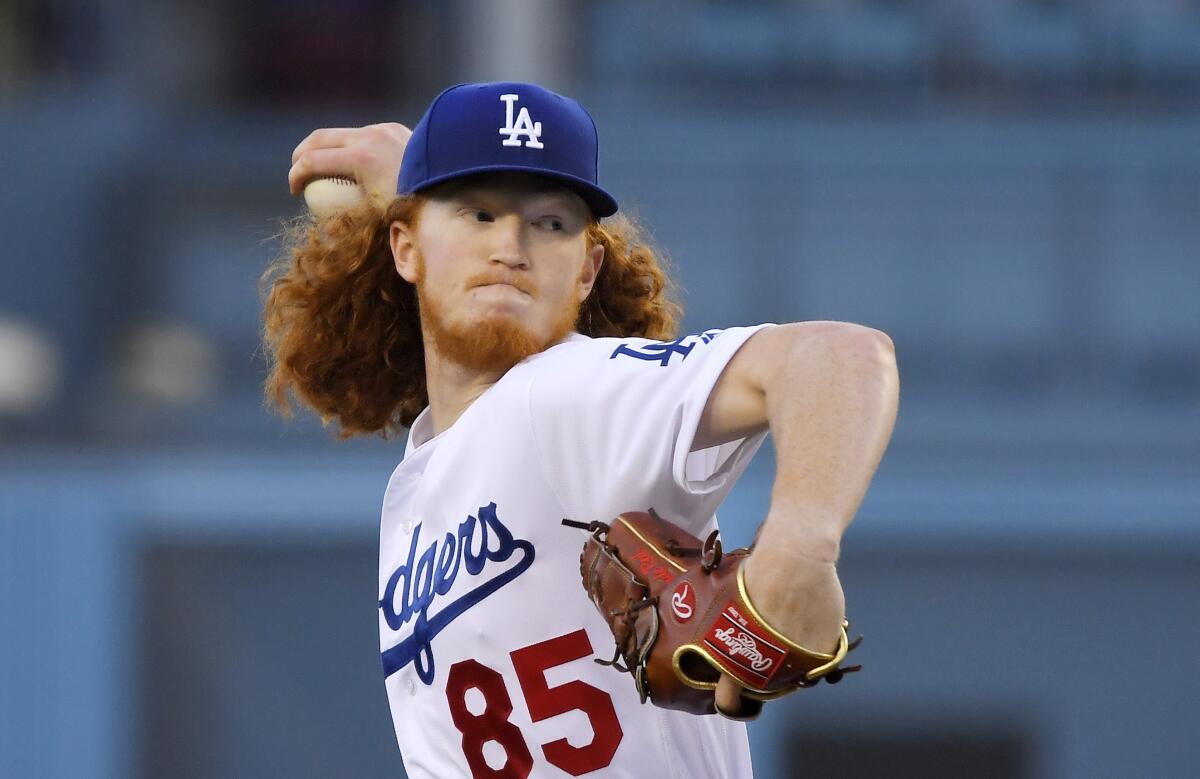
- Share via
So it had come to this, the Dodgers trying to make up for their potentially catastrophic inactivity at the trade deadline by auditioning a 21-year-old prospect for a role in their powder keg bullpen. Dustin May made his major league debut against such a backdrop of cynicism.
The skepticism started to recede the moment May unleashed the first of 97 pitches he threw in his start Friday night.
The sinker to Fernando Tatis Jr. was low and inside for a ball. The same pitch also registered 98 mph on the video scoreboard at Dodger Stadium.
The kid could throw. He could really throw.
That May departed from the game with a two-run deficit in the top of the sixth inning of a 5-2 loss to the San Diego Padres was almost irrelevant.
The run he gave up in the second inning was unearned. The three earned runs that were charged to him over 5 2/3 innings were all scored in the sixth inning. He gave up nine hits, but didn’t walk anyone and forced the Padres to hit into two inning-ending double plays.
He probably won’t be ready by October to start for a team with World Series aspirations. But the Dodgers won’t ask him to do that, not with Hyun-Jin Ryu, Clayton Kershaw, Walker Buehler, Rich Hill, Julio Urias and Kenta Maeda in front of him.
If May is on the postseason roster, he will be there as a reliever. He will be asked to pitch an inning, maybe two.
“I’m just trying to stay in the moment,” May said. “If the time comes that I move to the bullpen, I’m 100% up for it.”
He certainly has the arm to solidify the rickety bridge to inconsistent closer Kenley Jansen. He also has the look to be an attraction in a city that celebrates individuality.
Dustin May, playing in his first game with the Los Angeles Dodgers, flashes his promise as a major-league starter in a 5-2 loss to the San Diego Padres.
He is a long-legged 6-foot-6. He has fiery, curly, shoulder-length hair that sways every time he uncorks a pitch.
He looks like a skinny, red-haired version of New York Mets starter Noah Syndergaard, which has earned him the moniker “Gingergaard.”
“As long as it’s being said in a good way,” May said, “it doesn’t matter to me.”
So far, the reports on him have been positive, enough to where he’s widely considered the organization’s No. 1 pitching prospect.
About the only disconcerting aspect of his start Friday was his inability to miss bats. He induced only six swings and misses. He struck out three.
The fact he and fellow rookie Tony Gonsolin could figure into the Dodgers’ postseason plans speaks to Andrew Friedman’s continued inability to assemble a bullpen.
Friedman, the Dodgers’ president of baseball operations, has appeared to figure out almost everything else. His front office has maintained the franchise’s tradition of fielding a first-class starting rotation. It has assembled a frightening lineup.
Relief pitching remains a problem.
“I think it’s a challenge in every team in every market,” Friedman said. “I have seen things where people talk about 2017 and the bullpen not being good. I could not disagree more. It was an exceptional bullpen.”
Told the 2017 season was an anomaly, Friedman replied, “Let’s start with the most basic point. I think every team in baseball would like to be elite in terms of their position players, their starting pitching and their bullpen. If you ever have to choose one to not be elite at, it’s the bullpen. All are really important. Bullpen is the most volatile.”
But why?
Friedman said that whereas front offices have a decent idea of how starting pitchers are affected by workloads, they have trouble making the same determinations with relievers.
He offered a hypothetical example of a reliever who warms up but doesn’t pitch one day, then pitches the next two days.
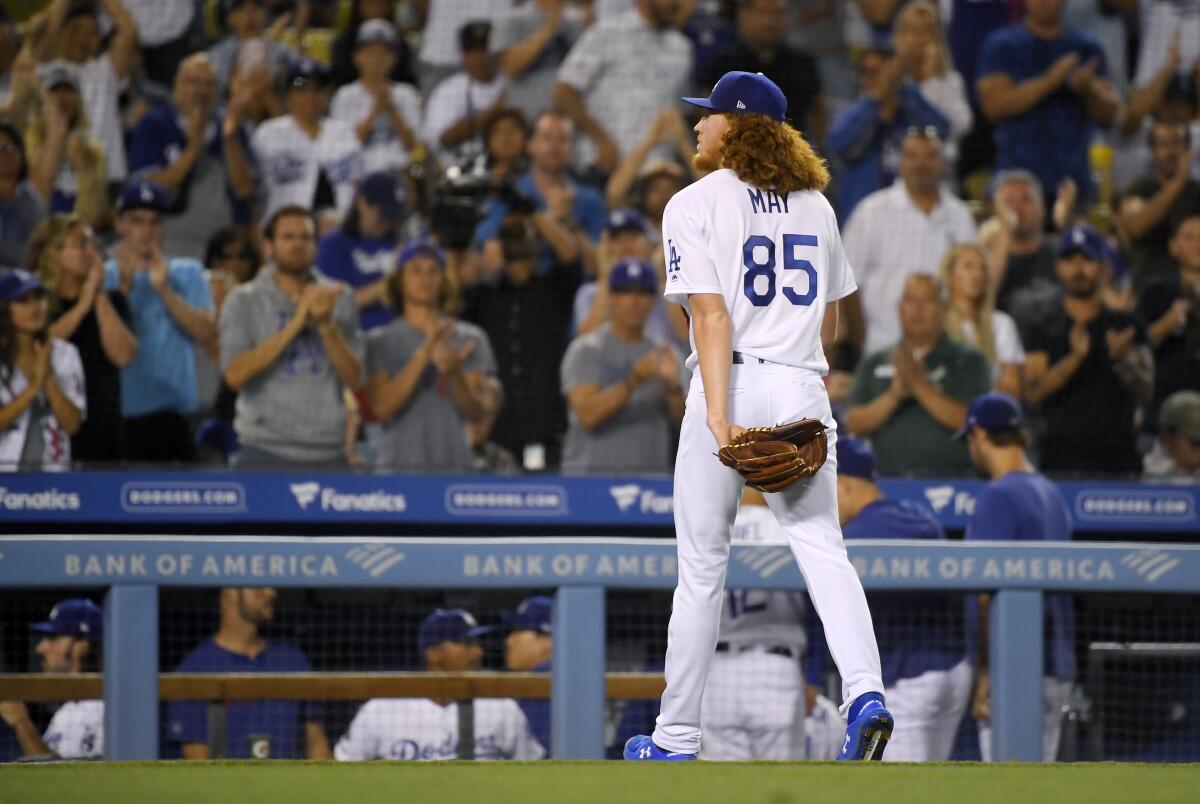
“The cumulative effect of the workload, I just don’t think we’ve wrapped our arms around as an industry,” Friedman said.
Players such as May offer him an out.
If Friedman’s paralysis at the trade deadline point to shortcomings in the front office, May’s ascension signals a positive trend for the organization.
Friedman’s front office can draft.
As much as has been made of the group’s ability to integrate young players into the major league roster, the reality is the majority of the team’s homegrown stars were inherited from the previous regime.
Cody Bellinger was drafted by Logan White, who was the scouting director under former general manager Ned Colletti. White now works for the San Diego Padres.
Corey Seager was also drafted by White. So was Alex Verdugo.
The Los Angeles Dodgers placed starting pitcher Hyun-Jin Ryu on the 10-day disabled list because of neck soreness.
But players drafted by Friedman’s scouting director, the well-regarded Billy Gasparino, have started to trickle into the major leagues over the last couple of years.
Walker Buehler was selected by Gasparino in the first round of the 2015 draft. The same draft has produced Matt Beaty, Kyle Garlick, Josh Sborz and Edwin Rios.
Gonsolin and catcher Will Smith were part of the team’s next draft class.
“Obviously, it starts with talent and then it’s about the development process and getting guys as ready as they can to get to this level,” Friedman said. “It’s also about knowing their makeup and when that next test is appropriate.”
By refusing to pay the bounty for an elite reliever, Friedman gambled that May or Gonsolin will soon be ready to pitch high-leverage innings in October. The wager could determine whether the season ends with a World Series title or another crushing disappointment.
More to Read
Are you a true-blue fan?
Get our Dodgers Dugout newsletter for insights, news and much more.
You may occasionally receive promotional content from the Los Angeles Times.

